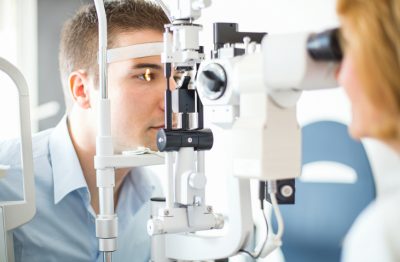Are you in need of an eye doctor? How do you know whether you need an optometrist or an ophthalmologist? At Elmquist Eye Group, we’ve got you covered. No matter what type of eye care you need, having a local eye doctor is very important and, with our three convenient locations, you are sure to find one near your home or office. Let’s explore the differences between these two doctors.
Optometrist vs. Ophthalmologist
 There are two types of eye doctors, optometrists and ophthalmologists. If you’ve been going to regular eye exams for glasses or contact needs (and we hope you have!), you have seen an optometrist. Optometrists are doctors who earn a Doctor of Optometry (OD) degree; they perform eye exams to fit patients with an eyeglasses or contact lens prescription and can also prescribe certain medications. If you simply need routine eye care, an Elmquist optometrist is a good choice.
There are two types of eye doctors, optometrists and ophthalmologists. If you’ve been going to regular eye exams for glasses or contact needs (and we hope you have!), you have seen an optometrist. Optometrists are doctors who earn a Doctor of Optometry (OD) degree; they perform eye exams to fit patients with an eyeglasses or contact lens prescription and can also prescribe certain medications. If you simply need routine eye care, an Elmquist optometrist is a good choice.
On the other hand, an ophthalmologist is a more specialized eye doctor. Ophthalmologists diagnose and treat eye diseases, treat patients with medical conditions that cause eye complications, prescribe medicines and perform eye surgeries. These doctors earn a medical doctor (MD) degree or a Doctor of Osteopathic Medicine (DO) degree and often specialize in a particular area of eye care, such as retinal surgery or pediatric care.
Working Together for Your Health
Optometrists and ophthalmologists at Elmquist work together for early detection of diseases like diabetes, glaucoma and macular degeneration. Many of these eye conditions have no symptoms in the early stages, so a comprehensive eye exam is often the only way to detect problems early.
For example, diabetes damages the blood vessels in the eyes. The condition, called diabetic retinopathy, has no symptoms, so patients suffer damage without even realizing it. Glaucoma is the same; although over four million Americans have it, only half are diagnosed.
Regular eye exams are important, and we recommend exams twice a year for people over age 30, and particularly for people over age 60. The benefits of a dilated eye exam far outweigh the minor inconveniences; these exams give the Elmquist team insight into your current state of eye health.
Do I need an ophthalmologist?
If you already have any form of eye disease, you need to see an ophthalmologist; this is your best choice. We recommend that our patients with a family history of any eye disease also see our ophthalmologists. Furthermore, patients with other health conditions like diabetes should also see an ophthalmologist.
Choose the Right Team
Why not choose an eye care doctor who has everything you need, for every occurrence at every age? We understand that choosing an eye care provider is an important health care decision. Our expert Elmquist Eye Group team is experienced in meeting all your eye care needs at any age. Why not call us today to schedule your appointment?
